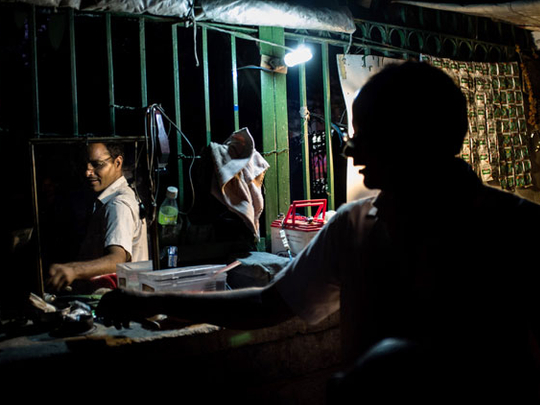
Dubai: “I am not in power — and with the current state of power in India — what’s the point in having a Power Point?” This is the view of Suresh Prabhakar Prabhu, former Indian Power Minister, on the Indian power sector, when I sought his presentation just before his keynote address at a gathering of the Institute of Chartered Accountants of India (ICAI) last week.
He was hinting at the recent power cut that disrupted public life in nearly a third of power-hungry India last month.
Prabhu, himself a chartered accountant, however, did not have a presentation — neither a written speech. “But I will tell you what’s going on in India,” he quips at the quiet lobby of Crowne Plaza, Deira.
Once the roaring Asian tiger, India is no longer roaring. Circumstances have tamed it as the country begins to limp in a growth race involving the emerging economies.
“Agriculture represents about 17 per cent of India’s gross domestic product. About 63 per cent of the people share 17 per cent of the GDP while 37 per cent share 83 per cent of our GDP — that’s where the problem lies,” Prabhu, a four-time parliamentarian who held seven portfolios as Union Minister, says.
“The key is to formulate the right policies to provide necessary skills that could transform at least half of the 63 per cent farmers into skilled manpower to be absorbed by industries — that could have halved poverty in India. The skilled ones then could drive consumption and GDP growth.”
That way, he says, per capita income of farmers would have multiplied. But then, what happens to the agriculture sector, which feeds the country’s 1.21 billion people?
“Well, agriculture sector has a huge pool of ‘disguised employment’ which is not needed and the skill-based training will help the country to better utilise their potential. So, their removal from the sector will not affect food grain production.
“The government should soil test and map the arable land. Then we should develop and deploy agro-based technologies through cooperative societies to boost food grain production. That will help us gain additional food security,” he said.
India, the world’s second biggest producer of fruits and vegetables, also have huge losses due to the lack of facilities to preserve them, such as cold storages, enough mobile freezers and efficient cooling infrastructure at ports and airports.
However, these are least of India’s problems, Prabhu feels. India’s economic growth slowed to 5.3 per cent earlier this year from a near double-digit figure a few years ago.
Prabhu says, his country, which is suffering from ‘Policy Paralysis’, has the potential to grow at between 11-12 per cent.
“The biggest problem that I see is the government’s inability to drive the economic growth to its full potential, due to lack of strong political will and the right policies,” he says. “The government is suffering from policy paralysis. The recent scams — the 2G scam and the Coal Gate scandals have reduced the government’s ability to perform, let alone implement policies. It has lost moral power to enforce good policies.”
On top of these, the high cost of borrowing is going to discourage investors while the country’s infrastructure is in dire need of investment.
“Because of the recent issues, decision making has become slow in India,” Shahzaad Dalal, chairman and chief executive officer of ILF&S Investment Advisors, said. “Each government ministry and department has runs on its own pace. For example, Indian Railway is a government within the government.
“Besides, high interest rates are impacting the build-up of capital for investment.”
Prabhu referred to his push for the Indian Power Act of 2003 to that had broken the government’s monopoly in the power sector and paved the way for private participation amid objections from the trade unions.
“As a result, we added 55,000 megawatts of power in five years including 20,000 megawatts last year alone. No one wanted the Act. But I kept on pushing and finally got all to agree on it. Right now there are 200,000 megawatts under planning stage as private investment is increasing,” he says.
Despite a power shortage, the country loses 50 per cent of its power in distribution — system loss and other form of losses. The country needs to reform electricity distribution.
“As it is, demand supply mismatch is pushing inflation up while the current policies are costing the country’s exchequer $80 billion (Dh293.8 billion) annually in power, fuel, food and fertiliser subsidies,” he says. “The government should give our people less trouble.”
Privatisation, as part of overall economic reforms started in India in the late 1980s when Rajiv Gandhi spearheaded the move — a fundamental shift from the state-protected economy where the government played the key role. Later, P.V. Narasimha Rao assigned Dr Manmohan Singh, as Finance Minister to push ahead with the reform plan. However, more than a quarter century later, privatisation is still a work in progress. Why?
“The economic reforms did not take place as part of an overall vision. It started in bits and pieces — and we are still carrying out reforms in bits and pieces,” Prabhu says. “What we need, as a nation, is a comprehensive economic vision and realign all other strategies in line with the grand vision.”
Comparing India’s growth model with that of China, Prabhu says, China’s economic development was driven by government investment, while India’s was driven by private sector investment.
“We haven’t invested a quarter of the total investment seen in China. However, our growth almost matched the Chinese growth. So, the efficiency of our capital remains high,” he points out.
“Besides, with heavy government investment, China has could not create entrepreneurship, they created more workers. But we did create a pool of entrepreneurs.”
However, Prabhu feels, the biggest challenge in India lies in changing the mindset of people. “However, we need to change the politicians’ mindset first,” he says.










